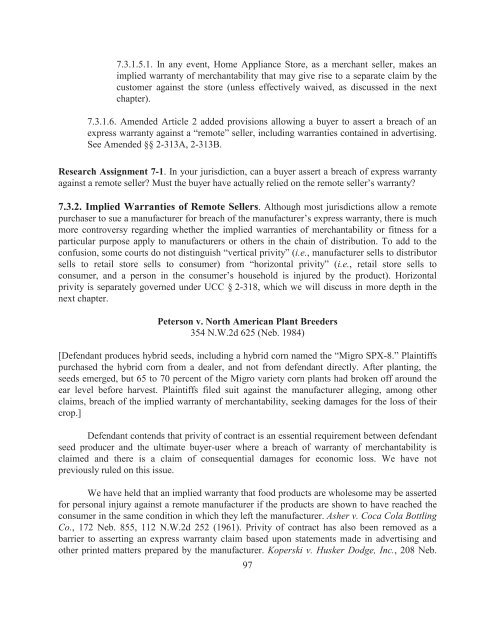Sales and Leases - A Problem-based Approach, 2016a
Sales and Leases - A Problem-based Approach, 2016a
Sales and Leases - A Problem-based Approach, 2016a
You also want an ePaper? Increase the reach of your titles
YUMPU automatically turns print PDFs into web optimized ePapers that Google loves.
7.3.1.5.1. In any event, Home Appliance Store, as a merchant seller, makes an<br />
implied warranty of merchantability that may give rise to a separate claim by the<br />
customer against the store (unless effectively waived, as discussed in the next<br />
chapter).<br />
7.3.1.6. Amended Article 2 added provisions allowing a buyer to assert a breach of an<br />
express warranty against a “remote” seller, including warranties contained in advertising.<br />
See Amended §§ 2-313A, 2-313B.<br />
Research Assignment 7-1. In your jurisdiction, can a buyer assert a breach of express warranty<br />
against a remote seller? Must the buyer have actually relied on the remote seller’s warranty?<br />
7.3.2. Implied Warranties of Remote Sellers. Although most jurisdictions allow a remote<br />
purchaser to sue a manufacturer for breach of the manufacturer’s express warranty, there is much<br />
more controversy regarding whether the implied warranties of merchantability or fitness for a<br />
particular purpose apply to manufacturers or others in the chain of distribution. To add to the<br />
confusion, some courts do not distinguish “vertical privity” (i.e., manufacturer sells to distributor<br />
sells to retail store sells to consumer) from “horizontal privity” (i.e., retail store sells to<br />
consumer, <strong>and</strong> a person in the consumer’s household is injured by the product). Horizontal<br />
privity is separately governed under UCC § 2-318, which we will discuss in more depth in the<br />
next chapter.<br />
Peterson v. North American Plant Breeders<br />
354 N.W.2d 625 (Neb. 1984)<br />
[Defendant produces hybrid seeds, including a hybrid corn named the “Migro SPX-8.” Plaintiffs<br />
purchased the hybrid corn from a dealer, <strong>and</strong> not from defendant directly. After planting, the<br />
seeds emerged, but 65 to 70 percent of the Migro variety corn plants had broken off around the<br />
ear level before harvest. Plaintiffs filed suit against the manufacturer alleging, among other<br />
claims, breach of the implied warranty of merchantability, seeking damages for the loss of their<br />
crop.]<br />
Defendant contends that privity of contract is an essential requirement between defendant<br />
seed producer <strong>and</strong> the ultimate buyer-user where a breach of warranty of merchantability is<br />
claimed <strong>and</strong> there is a claim of consequential damages for economic loss. We have not<br />
previously ruled on this issue.<br />
We have held that an implied warranty that food products are wholesome may be asserted<br />
for personal injury against a remote manufacturer if the products are shown to have reached the<br />
consumer in the same condition in which they left the manufacturer. Asher v. Coca Cola Bottling<br />
Co., 172 Neb. 855, 112 N.W.2d 252 (1961). Privity of contract has also been removed as a<br />
barrier to asserting an express warranty claim <strong>based</strong> upon statements made in advertising <strong>and</strong><br />
other printed matters prepared by the manufacturer. Koperski v. Husker Dodge, Inc., 208 Neb.<br />
97


















